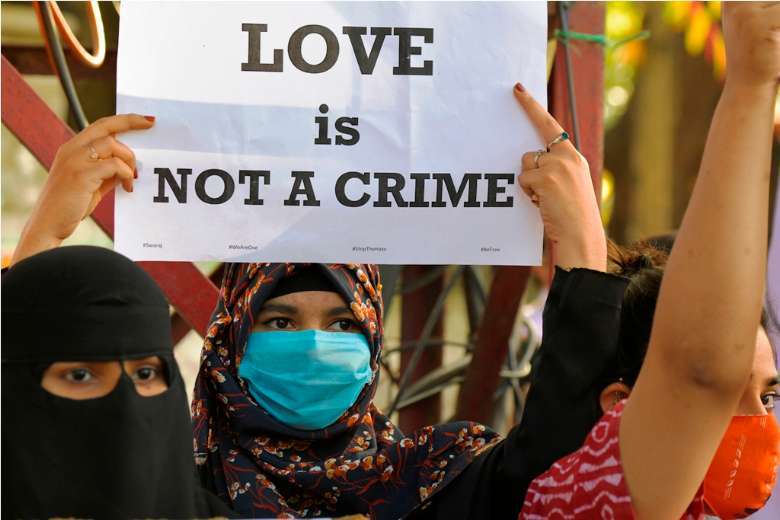Many bishops are prone to act without proper thinking in tune with the human family


A civil rights activist holds a placard during a demonstration condemning the government’s moves to enact a law against “love jihad” in Bangalore, India, in December 2020. (Photo: AFP)
It was on Jan. 14, 2020, that the synod of bishops of the Eastern-rite Syro-Malabar Church came out with a press statement on “love jihad,” which said Christian girls are lured through marriages to terrorism and its tragedies.
There was a hue and cry by the Christian community against the press statement.
The question of “love jihad” was investigated by the Kerala Director General of Police (DGP), who concluded that there is no proof for the existence of it. A similar investigation was also done in the southern state of Karnataka, but the result was the same.
In 2017–2018, India’s Supreme Court heard an appeal against a lower court annulling the marriage of Akhika, a Hindu woman who fell in love with Muslim man Shafin Jahan, and married him. She said she converted to Islam, changed her name to Hadiya, and married Jahan out of her free will. Her father claimed the marriage was an example of love jihad.
However, the top court confirmed the validity of the marriage and conversion, which had been earlier annulled by the Kerala High Court.
The Supreme Court came to its conclusion based on the investigation report submitted by the premier National Investigation Agency (NIA) at its behest. The investigating agency, India’s counter-terrorism task force, did not find any substance to the allegation of “love jihad.”
During a sermon delivered during a Mass on Sept 8, Bishop Joseph Kallarangattu of Pala warned the faithful of the dangers of “love jihad” and “narcotic jihad” that were being allegedly used to trap young non-Muslims.
He also accused those who deny the existence of “love jihad” of being blindsided.
“Like in other parts of the world, there is a section of Muslims in Kerala who want to create animosity between communities and spread religious hatred. Jihadis are using different means to spread Islam and they are into targeting young non-Muslim girls for the same,” he said citing examples of Nimisha, a Hindu girl, and Sonia Sebastian, a Christian girl, who got converted into Islam after falling in love with Muslim men and finally joined the dreaded Islamic State in Syria.
Bishops are respected as mature and responsible leaders of the society, who make timely interventions to guide not only the Christians but also the general public in matters of inter-communal relations. But that noble image of people with ethical power stands shattered now.
Pope Francis wrote the Encyclical Frattelli Tutti – All Brothers – particularly aiming at a relationship of dialogue and reconciliation with the Muslim world.
Responding to a journalist’s question about the killing of an 85-year-old Catholic priest by Islamic State on a Krakow-Rome flight in July 2016, Pope Francis said: “I think that in nearly all religions there is always a small fundamentalist group.”
Referring to Catholicism, he added: “We have them. I don’t like to talk about Islamic violence, because, every day when I look at the papers I see violence here in Italy – someone killing his girlfriend, someone killing his mother-in-law. These are baptized Catholics… If I speak of Islamic violence, I have to speak of Catholic violence. Not all Muslims are violent.”
Bishop Kallarangattu’s statements are without foundations and his new coinage “narcotic jihad” is uncalled for. The police chief he referred to did speak of sleeping cells of terrorists but never mentioned any religion in the context.
Love marriages, inter-caste and inter-religious marriages are facts of life in Kerala. The Church authority has to tolerate such marriages, respecting the freedom of adult men and women.
The bishop seems to have a sorry view of Christian girls in Kerala families. He sees them as easy prey to any sinister gang and goon. I am sorry to say he is prejudiced.
A majority of medical nurses working in Arab countries are brave Christian women from Kerala and such communal remarks can have dangerous consequences for them.
Bishops and priests must learn to respect women and their decisions.
Nick Van DenBroeke, a Catholic priest, urged his parishioners in St. Paul-Minnesota Catholic archdiocese to oppose Muslim immigration because according to him Islam was “the greatest threat in the world” to the United States and Christianity.
There were demonstrations in the streets against it. In a statement from the archdiocese, Archbishop Bernard Hebda said the church’s teaching is clear and quoted Pope Benedict XVI as saying that the church looks with esteem to Muslims, who worship God through prayer, fasting and the giving of alms.
“If all of us who believe in God desire to promote reconciliation, justice and peace, we must work together to banish every form of discrimination, intolerance and religious fundamentalism,” Archbishop Hebda said.
He added that Pope Francis also has stressed the importance of dialogue between Catholics and Muslims and has urged them to be “true promoters of mutual respect and friendship, in particular through education.”
In his statement, Van DenBroeke said his homily “contained words that were hurtful to Muslims. I’m sorry for this. I realize that my comments were not fully reflective of the Catholic Church’s teaching on Islam.”
We in India are facing the critical issue of communal polarization. Every religion is facing the temptation of communalism. Like the mythical figure Narcissus, people risk becoming infected by a contagious spiritual virus that turns them into mirrored men and women who only see themselves and nothing else.
The second crusade was preached by an abbot, Bernard of Clairvaux, and Francis of Assisi was the saint who crossed the lines of control and met Sultan Saladin, making them friends. At present, the church leadership is facing a choice between Francis and Bernard.
When we fall to the temptation of excluding the other from our horizon, life withdraws to itself.
When the church does not emerge from itself to a transcending humanism, it becomes self-referential and therefore becomes sick.
The evils that, over time, occur in ecclesiastical institutions have their root in self-referentiality; it is a kind of theological narcissism.
Many bishops are prone to act without proper thinking in tune with the human family. It is easy to fall into the language of a lie invented by ourselves.
A lie was possible only after it became capable of conceiving truth. It emerges as something directed against the conceived truth. In a lie, the spirit practices treason against itself.
You betray yourself; become the Prometheus of mankind, a conqueror who subjugated inferior races. We return to barbarism, which is hostile to civilization.
The word, scapegoatism, is the tendency to treat people like scapegoats or make them scapegoats.
Religion can become demonic once it becomes irresponsible and thoughtless. There is a demoniac element in fanatical fundamentalism.
We have to see these things in their total banality, in their prosaic triviality, because that’s what truly characterizes the people involved in it. These people do not think about what they do.
Bacteria can cause epidemics that wipe out nations, but they remain merely bacteria. It may look very unfair to name them villains.
Such a person may have extraordinary diligence in looking out for his personal advancement; he may not have other motives at all. He, to put it colloquially, never realized what he was doing.
Such Christian fundamentalists seem to be on the increase here.
Father Paul Thelakat is a Catholic priest of the Eastern-rite Syro-Malabar Church and former spokesman of its Synod of Bishops. He is editor of Light of Truth, a church-run biweekly from Kochi. The opinions expressed in this article are those of the author and do not necessarily reflect the official editorial position of UCA News.
